
By Jonathan Wojcik
ENTRY 10: RUBBER

Our tenth entry is arguably one of the oddest monsters you'll read about all month, but with undeniably the oddest surrounding narrative, written and directed by Quentin Dupieux in 2010.

Rubber takes place in the California desert, where a group of people have been gathered to be the live audience of a film. A sheriff (Stephen Spinella) only known as Chad then approaches the camera and gives a speech about how many things in both film and reality happen for simply "no reason." We are also introduced to one audience member known only as The Man in the Wheelchair (Wings Hauser) and a geeky accountant (Jack Plotnick) who hand out binoculars to the audience so they can watch the action.
And what action is that?

We cut to an old tire lying half-buried in the desert, which suddenly begins to stir, righting itself and shaking off its layer of dust. It cautiously tests its ability to roll before it sets off on its own, but soon finds a plastic bottle in its path. It seems uncertain what to do, but charges forward and easily crushes the bottle beneath itself. It then encounters a
scorpion, not necessarily directly in its path, but perhaps satisfied by the crunch of the bottle, it adjusts its course to run over the hapless arachnid.
The tire then bumps into a glass beer bottle, which it is unable to crush. It tries again and again, until it becomes so frustrated it can do nothing but vibrate with rage...and the glass bottle shatters. This time the tire changes course, no longer driven to simply move forward, but possessed of a newfound love for destruction. This entity is officially named Robert, and he is the main character.
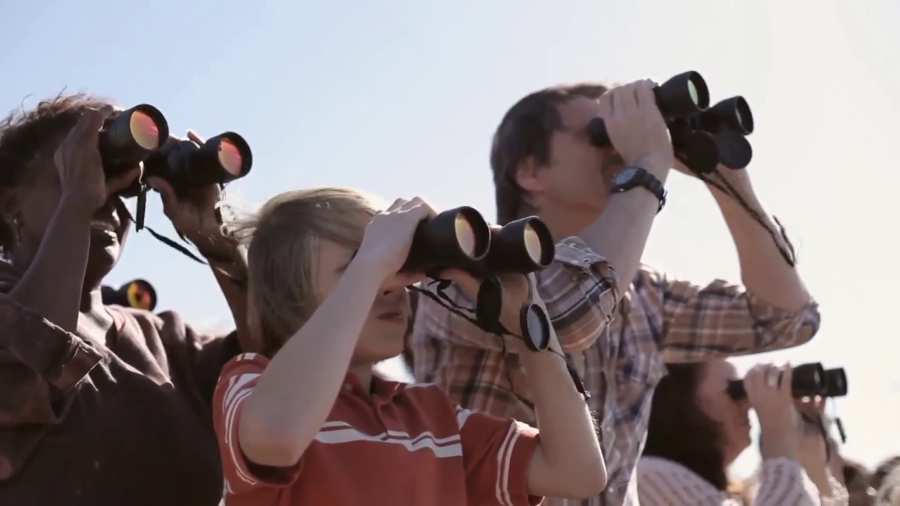
In the distance, we see the gathered audience watching these events through the binoculars, arguing over whether the correct term for the tire's abilities are "telepathic" or "psychokinetic" debating whether they like where this story is going. This is the core angle of the movie,
Rubber: the events seem to "really" be happening and this audience is "really" present to witness them in-person, but they are also aware that it's all just a strange B-movie. Robert is
psychokinetic by the way,
telepathy is only the ability to communicate mind-to-mind.
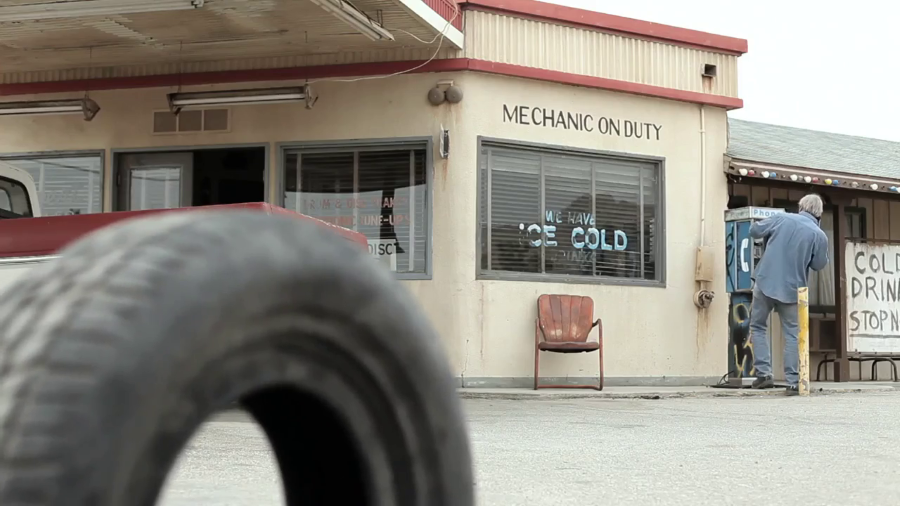
Robert wanders for a while, "drinks" from a dirty puddle, lies down for a little nap one night, explodes a rabbit and explodes a crow before reaching the highway and encountering his first human, Sheila (Roxane Mesquida) as she drives past. Robert tries to focus his psychokinesis on her, but she's out of range too quickly, and he gives chase until he comes to a gas station, where he finds a nameless man refueling his pick-up. Concentrating, Robert learns that his powers are at least enough to explode a human head.

Robert catches up to Sheila at a motel, where she's taking a shower and has left the door slightly open. The tire seems suddenly hesitant to detonate her cranium, apparently experiencing confusing new feelings that I guess are only natural for tires who have reached a certain age, at least until Sheila finally closes the door - never noticing Robert was there.
Some members of the audience make a lot of dirty jokes, which annoys those who are trying to take the plotline seriously. As night falls, we see that Robert has somehow started watching television in another room. And as the audience tucks in to camp for the night, they complain about how ravenously hungry they are. One boy says he found the rabbit killed earlier by Robert, but the others dismiss him - because the rabbit is only a prop.

We then see the Accountant in yet another motel room, and after receiving a phone call from someone he refers to as "master," he proceeds to take various kitchen tools out of a briefcase, and we see that he's sharing his room with a live turkey. The next morning he awakens the sleeping audience with a cry of "FOOOOOOOD!" and dumps the freshly roasted turkey out onto the sand. The audience rip it apart mindlessly, recreating the cannibalism scene from
Night of the Living Dead complete with a horror soundtrack.

Robert ends up murdering the motel's cleaning lady off-screen, and a teenage boy, the son of the motel's manager, tries to tell his crabby and uninterested father about having seen "a live tire." Robert then sees Sheila pass by his window and follows her to the swimming pool, but once again can't bring himself to kill her, or even move at all as she passes him by. Once he's all alone again, he seems curious about the pool and dives in, while the audience discusses whether or not Robert should have been able to float.
This conversation is cut short when one audience member develops stomach cramps. Then another, then the rest. The Man in the Wheelchair informs them that the turkey was a trap and that they've been poisoned, but not to worry, since "they" won't get away with it and he was smart enough not to eat any.

Police are now pursuing the mysterious death of the cleaning woman, but of course won't believe the young boy claiming that the tire did it. The investigation is lead by the same Sheriff who addressed us at the start of the film, and he still seems aware of the fourth wall even as he remains in-character. While talking to the motel manager, a timer begins to chirp, and the Sheriff states that, by now, "the spectators" have all died from the poison and "everyone can stop now."
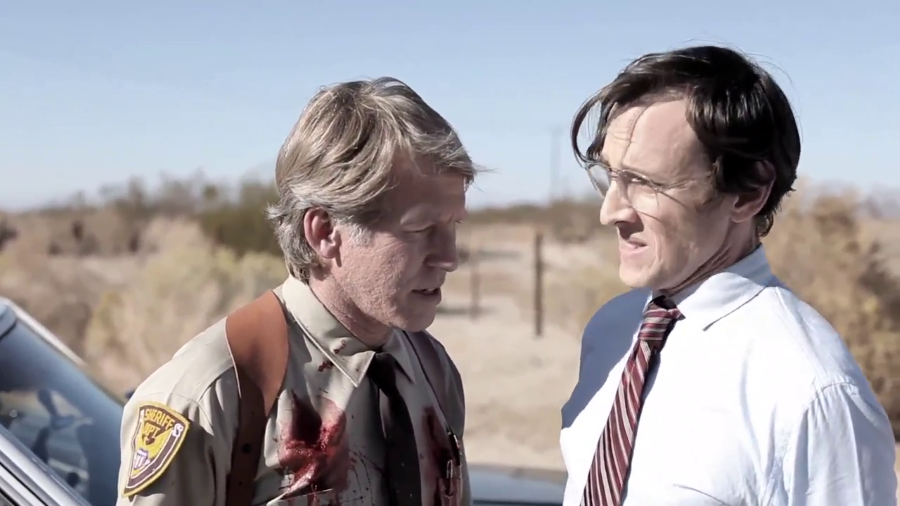
He gathers the other police and informs them that they've all done a good job but can finally all relax: there's nobody watching anymore, so they can all wrap it up and go back home to their families. The others are as confused by this as any real people would be, arguing that they have a dead body to deal with it. Sheriff Chad argues back that they all need to "stop acting like this is real life," and when they only grow even more confused, he orders them to shoot him right in the chest so he can prove that this whole scenario is fake.
Despite the convincing spatters of blood, Chad shows no sign of pain, and swears that even the corpse is just an actress playing dead, imploring the officers to shake her awake. They note that she is in fact
headless, but he persists until they tell him how cold her body is, which for whatever reason gives him pause. The Accountant then approaches, nervously informing Chad that there's still at least one live spectator watching as we speak, and therefore everyone "has to go on." This seems to disturb Chad, who apologizes and tells everyone to forget everything he's just said. He even returns to interviewing the manager, who is shocked by the bloody gunshot wounds, but Chad insists he just forget about it and "keep going" where they left off.

Midway through their conversation, the manager's head is exploded by Robert, and Chad half-heartedly reads the line apparently intended for this moment, "Oh my god, the kid was right, the killer was a tire." He scoffs, finding the dialog corny and the whole situation apparently exhausting. He presses on regardless, telling the other officers to be on the lookout for the deadly rubber circle.
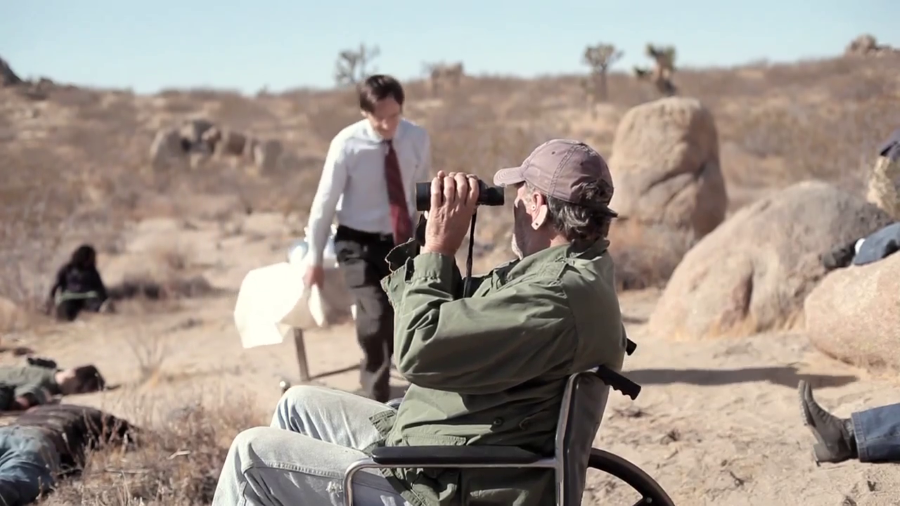
Back out in the desert, the Accountant tries to tempt the Man in the Wheelchair with tuna, chocolate eclairs, yogurts, anything at all to just poison himself already and "let it all end." The Man assures him he's not hungry, and that he "just wants to watch the end in peace."
The accountant argues that there
isn't an end, and the Man says he'll watch it anyway, because he likes it. "He's rolling. The cops are chasing him. It's a pretty exciting scene" he says flatly, and even lets the Accountant watch with him. After a few moments of this chase scene, we come back to the Accountant droning on about his childhood...something about, uh, smashing his brother in the head with a giant rock? Alright, man...while he eats the poisoned food himself, really enjoying the eclairs until he finally starts to cramp up, wailing in pain and begging not to die as he complains that he wasn't the one meant to eat the food.

After popping the brains of a few cops, Robert witnesses a gruesome sight: a dumping ground where a massive heap of old tires are being burned. Cut bruptly to a few days later, and we see one shot after another of bloody carnage around town, headless bodies littering the streets and shopping centers. Robert, however, is found still sitting in its most recent victim's house, seemingly transfixed by a marathon of NASCAR.
Sheriff Chad devises a truly insidious trap for the villain involving Sheila, a mannequin disguised as Sheila, and some dynamite, in a scene that I feel best summarizes the entire tone of the movie:
...The Man in the Wheelchair interrupts this scheme, however, to criticize the logic of the whole scenario, arguing with Chad that they may as well just take a bazooka or a flamethrower to Robert while he's distracted, rather than count on the being to detonate the booby-trapped lure. Chad insists his plan will work just fine, but he doesn't seem to have accounted for the fact that Robert only blows up
heads, and the explosives are only hooked up to the mannequin's torso.

Irritated that he was proven wrong and sick of being part of this story, Chad walks right into the house with a shotgun and puts Robert down, much to the wheelchair man's disappointment...

...Until a
tricycle rolls its way out of the house, and the Man in the Wheelchair tries to get Chad to come back and continue the plot. The tricycle turns toward him, and he tries to explain to it that he's "not really a character," only a spectator, when tricycle-Robert blasts the
entire old man to pieces.

Sheila watches the tricycle pass her by and continue down the road. As it travels, every discarded tire in its wake begins to stir, and soon enough it has a small army ready to storm their next target, Hollywood itself.
MONSTER ANALYSIS: ROBERT
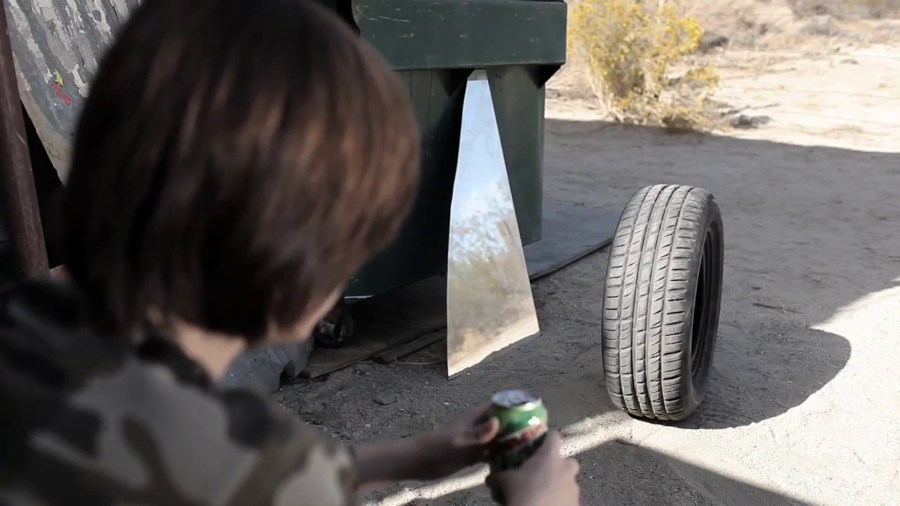
Meta narratives are nothing new, but this one blurs the borders of its internal reality so strangely that I can't say I've ever seen anything quite like it; instead of a "movie within a movie," where the saga of Robert is an in-universe piece of media, it's more like the Spectators, the Accountant and Chad are part of a "reality within the movie." According to director Quentin Dupieux, this idea came to him when one of his own movies flopped, and he once found himself the only person watching at a local theater, wondering what the "point" is of playing a film without a single spectator.
Dupieux states that he originally conceived of Robert as a sadistic villain, but following a tire around with a camera gave him the impression of a "dumb dog," and he found difficulty seeing any "evil" in the character. He even began thinking in terms of how endearing
Wall*E was without any dialog or facial expressions, and Robert became a more innocent sort of antagonist.

The degree of personality communicated by this blank, black circle really is impressive, too. By simply rolling around and occasionally shaking, the silent object reads indeed like a naive and curious animal, something that doesn't know (or have reason to wonder) why it exists, but quickly figures out what it can do and takes a crude sort of interest in how the world works. We never know exactly why he takes such an interest in Sheila, except that she
is notably both the first human he ever "sees" and the first thing to ever "escape" one of his attacks, even if she doesn't know it. I'm especially endeared by the scene in which he watches Sheila climb out of the swimming pool, waits for her to leave, then dives in himself, as though compelled to find out what was so appealing to his human crush about the mysterious pit of water.

You could choose, if you like, to pretend that there isn't really any "meta" going on at all, but that there's simply an anomalous force orchestrating impossible events that some people are driven to believe is "just a movie," some absurd SCP-esque situation where an entire town is taken over by a simultaneously real and unreal narrative, but Dupieux is pretty up front about the movie being largely for pure fun, and that even the opening monologue is meant as confirmation that there isn't any deeper meaning, nor any intended explanation behind any of its events.
I personally like it more for this "lack of reason," but it's not for everyone. Why, for some people, I'm sure the senselessness of the whole thing might get a little
tiresome.
NAVIGATION:

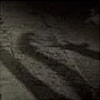
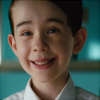
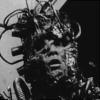
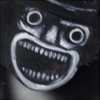

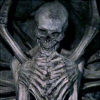

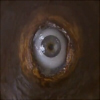


WAYS YOU CAN SUPPORT THIS SITE!







































